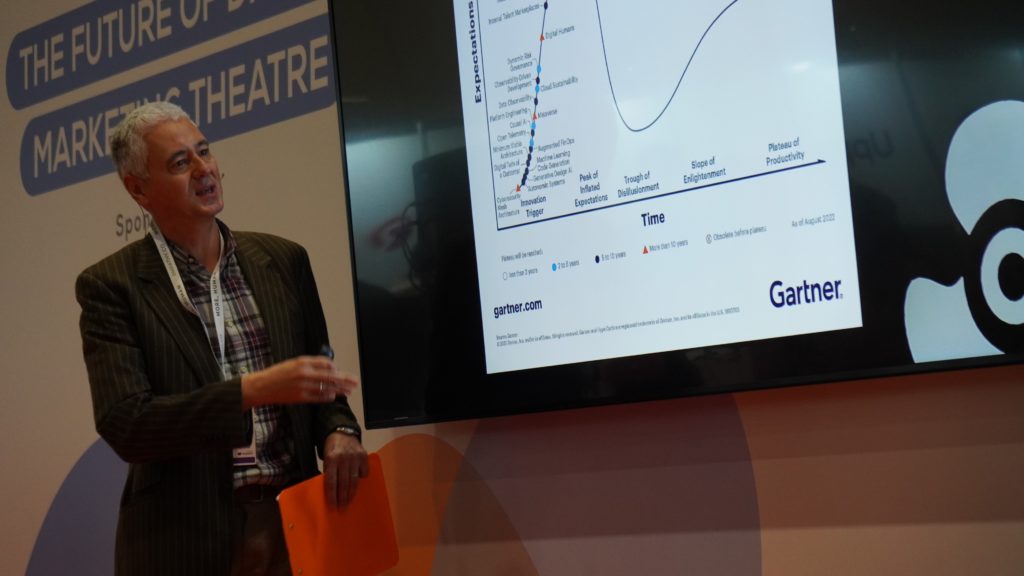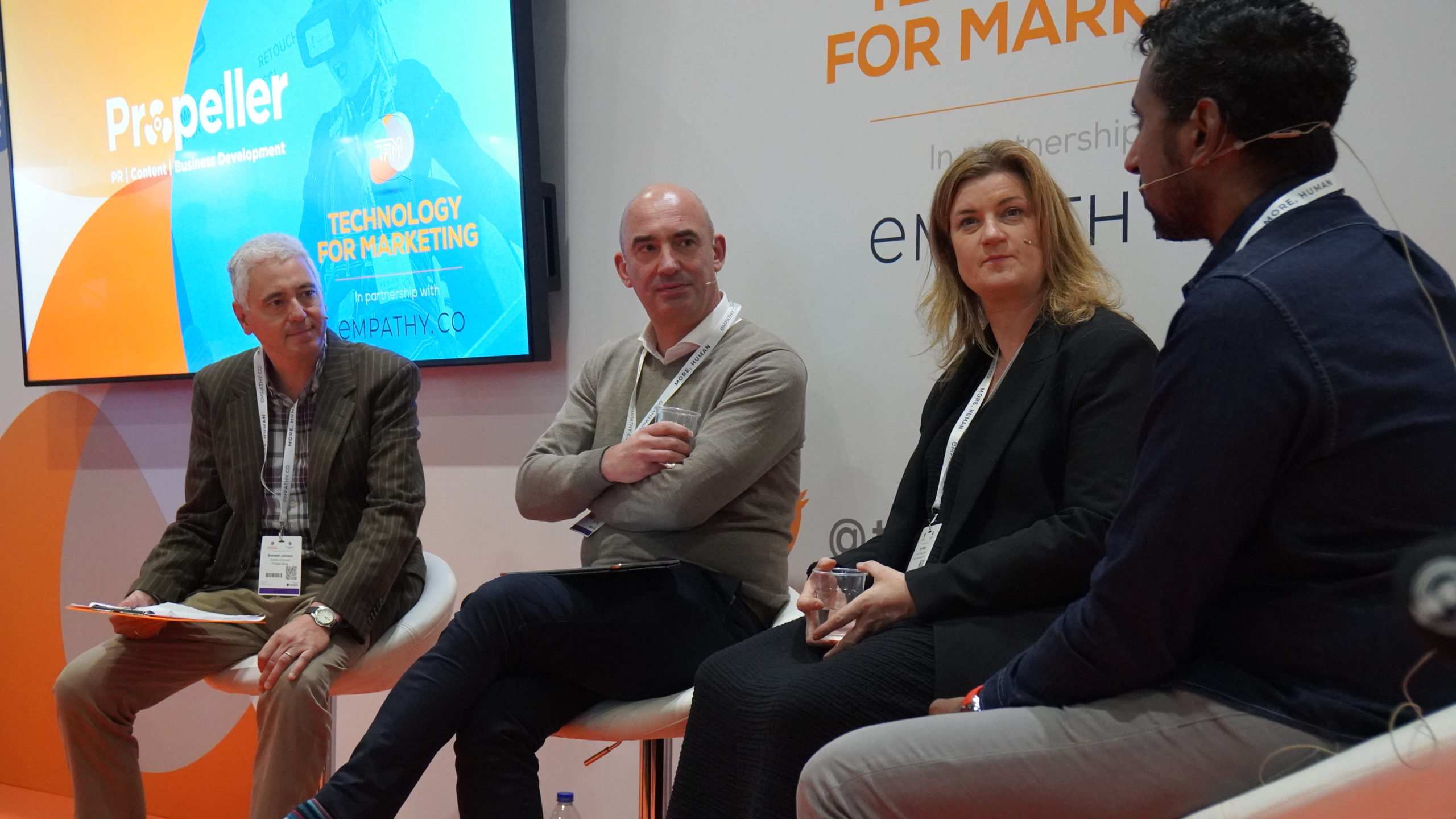Talk around the metaverse seemed to reach a crescendo at the start of the year with big tech players like Meta, Microsoft and Apple, all companies with a vested interest in it succeeding, setting the pace.
Propeller’s panel at this year’s eCommerce Expo Things can only get meta – or can they? Is the metaverse a useful panel or a genuine game changer? explored the practical uses of the metaverse for brands for marketing and commerce.
The panel was hosted by our Director of Content Branwell Johnson and featured Seb Bardin, Head of Ecommerce Marketing at Unilever, Fern Miller, Executive Strategy Director at design and innovation agency R/GA London and Gareth Turner, former marketing lead at Weetabix, Heineken and Arla Foods and founder of the consultancy Big Black Door.
A generally agreed definition is that the metaverse should be a series of connected, engaging, immersive worlds. At present we have some of the building blocks in the form of self-contained platforms like Roblox, Fortnite and Meta’s VR initiative Horizon Worlds.
The success of the metaverse for brands will depend on consumers understanding what’s the real benefit for them and brands providing a compelling enough reason for a visit to their experiences.
The metaverse needs mass
Data from a recent YouGov study Unlocking The Metaverse shows 37% of those polled in the UK are confident they can describe the concept – but Bardin pointed out over-technical explanations and language are still confusing people.
Turner stressed “right now it is a solution to a problem and we don’t really know what that problem is … it’s not relevant to the brands I work on right now” but he pointed to how QR codes had found their role during the pandemic and how quickly such a catalyst could happen for the metaverse.
The panel agreed that the majority of mass market consumer brands in FMCG and CPG are going to hold back until more consumers join the party. “When it reaches a scale that is significant enough it might be interesting to a brand like Weetabix, “ said Turner. The YouGov study shows 67% of the UK respondents are ‘curious’ about the metaverse and 4% are ‘trialists’, who claim to have already engaged with our rudimentary metaverse-like experiences. Once the curious 67% move across to trial then the panel agreed the metaverse is on the move.
The latest Gartner Hype Cycle of Emerging Technologies places the metaverse at the very bottom of its climb to the ‘Peak of Inflated Expectations’ and nowhere near approaching the ‘Trough of Disallusionment’ yet.

Of course, encouraging mass engagement with the metaverse means designing both hardware and experiences for all types of people. And that means making sure the designers and creators are not drawn from the same pool but reflect the diversity in the population at large.
Marketing ground rules for a metaverse trial
The panel sees a definite role for the metaverse in testing and trialing ideas for brands. Miller said: “It’s an opportunity to experiment to take your brand in the future. It’s a place where you can experiment, innovate and extend what your brand’s purpose is – it frees us from a lot of constraints.”
When thinking about a metaverse activation Bardin said that marketers should ask themselves “what can you as a brand offer your consumer aligned with your brand purpose and values. Know what you want to do – create visibility? Create a community? Or sell a product? Understand what needs you are trying to meet.”
He pointed out that trials should not be one off and a mantra should be “test to scale rather than test to learn.”
Turner added that “good sound marketing fundamentals don’t go away” and whatever a brand did it should ladder back to its overall strategy. “If part of your strategy is delivering in a better way and more engaging way and the metaverse can do the job, then it’s an amazing tool.”
In terms of product prototyping he said that the metaverse could be a good ‘lab’ in which to evaluate and validate Minimum Viable Products at scale. It’s relatively easy and cheap to set up, for instance, a test drive experience of the latest Ferrari. “It’s another way to give more people a chance to try something they’d not normally try.”
Turning to the sales possibilities via the metaverse, Miller said compelling metaverse experiences will allow brands to connect directly with customers instead of being disintermediated by retailers.
She pointed to how Nike is using the metaverse with its creation of Nikeland on the Roblox platform. Sales of virtual goods are taking off as consumers start to personalise their avatars in platforms like Roblox – Nike sold 600 pairs of NFT collectible sneakers in six minutes for $3.1 million. The virtual interest can drive physical sales and Miller said that the metaverse can be a way to address some of the systemic problems now surfacing that brands are finding in their D2C journey.
She also added that brand safety needs to be considered in any experiences devised.
To infinity and beyond
Best predictions for mass take up are still five years or so away. A lot depends on the tech companies devising seamless, easy-to-use tools to interface with the virtual worlds that people will embrace – and this might not be a full immersive headset of the Oculus Rift type. Miller predicts the metaverse will more likely evolve into “a mesh of experience that we will walk through in our lives – and sometimes be happening without us noticing.”
